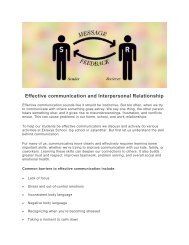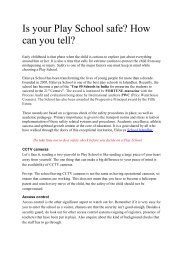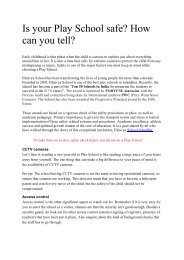Anger management
Frequent incidents of anger and rage expressed by adults in a socially inappropriate manner are a great cause for concern. Children learn from observing the adults around them. Eklavya School, Jalandhar; top school in Jalandhar; teaches students how to express their emotions and feelings in a socially acceptable manner. Here are some tips on anger management.
Frequent incidents of anger and rage expressed by adults in a socially inappropriate manner are a great cause for concern. Children learn from observing the adults around them. Eklavya School, Jalandhar; top school in Jalandhar; teaches students how to express their emotions and feelings in a socially acceptable manner. Here are some tips on anger management.
You also want an ePaper? Increase the reach of your titles
YUMPU automatically turns print PDFs into web optimized ePapers that Google loves.
Ask yourself why you’re angry (problem solve). If you ask yourself why you’re angry, and<br />
really think about your answer, you might figure out a problem you can solve or even uncover<br />
some of the sneaky feelings that feel like anger.<br />
Use “if–then” statements to consider the consequences. If–then statements mean that you ask<br />
yourself what might happen if you do something. They are best used when you are deciding what<br />
to do about a situation or problem. If–then statements help you make better choices by helping<br />
you understand the consequences of your actions.<br />
Count up to or down from 10. Sometimes, quietly counting to 10 is something some people do<br />
to stop themselves from doing something too quickly. Counting to 10 as soon as you notice<br />
you’re having an angry reaction can give an angry person just enough think time to make sure<br />
their first idea is a good idea<br />
Listen to another person. If you’re angry about something or with someone else, talking to<br />
someone and listening to their perspective—even the person you’re angry with—may help you<br />
understand exactly what caused the problem so you can fix it.<br />
Focus on your breathing. Focusing on breathing can help during angry moments in several<br />
ways. First, it takes your attention away from the anger for a moment, just like when you count<br />
to 10.<br />
Second, breathing in a certain way, slowly and deeply (so deeply that your belly moves, too), and<br />
in through your nose and out through your mouth, can often help people who are angry to begin<br />
to calm down.<br />
Take a walk or step away. Change the environment by taking a walk or stepping away if you<br />
can. Just like counting to 10, and thinking about your breathing, walking away from a situation<br />
that is making you angry can sometimes help prevent you from reacting to a situation too.<br />
Give yourself some good advice (self-talk). Self-talk means that you say to yourself the things<br />
that a good friend would say to calm you down, such as, “Calm down,” “Maybe it’s not that<br />
bad,” or “Let it go.” It is best used when you first notice that you are angry (emotional reaction<br />
stage). Its purpose is to help calm you down.<br />
Look for the humor—without making fun of someone. Sometimes we get angry for silly<br />
reasons that are hard to explain. Maybe you don’t even really want to be angry. Sometimes, if<br />
there is no danger, you can count to 10 and imagine what it must look like if this whole angry<br />
situation was something you were watching in a TV comedy. Sometimes, when you really think<br />
about it, some of the things that make us angry can seem really silly.<br />
SUGGESTIONS FOR LONG-TERM ANGER MANAGEMENT<br />
• Keep a diary of your anger outbursts, to try and understand how and why you get mad.<br />
• Consider assertiveness training, or learning about techniques of conflict resolution.
















